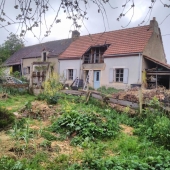
 23
23





 gardening
gardening
 natural building
natural building
 woodland care
woodland care
 round wood woodworking
round wood woodworking
 tool care
tool care
 earthworks
earthworks
 dimensional lumber woodworking
dimensional lumber woodworking
 rocket
rocket
 food prep and preservation
food prep and preservation
 animal care
animal care
 foraging
foraging
 community living
community living
 textiles
textiles
 greywater and willow feeders
greywater and willow feeders
 metalworking
metalworking
 plumbing and hot water
plumbing and hot water
 electricity (including solar)
electricity (including solar)
 commerce (be able to do business)
commerce (be able to do business)
 natural medicine
natural medicine
 nest
nest
 homesteading
homesteading
 oddball
oddball
For reference, here Paul described about how long each badge should take:
paul wheaton wrote:A formal PEP1 program would last 2 weeks (~80 hours). Completing the PEP1 program requires 16 sand badges.
A formal PEP2 program would fill a summer (~510 hours). Requires 1 wood badge + 7 straw badges + 14 sand badges.
A formal PEP3 program would take about nine months (~1550 hours). Requires 7 wood badges + 15 straw badges.
A formal PEP4 program would take a little over two years (~4700 hours). Requires 3 iron badges + 12 wood badges + 7 straw badges.
In general, I think the approximate time to complete a badge would be about:
sand badge: ~5 hours
straw badge: ~40 hours (+35 hours over sand, about 4 or 5 days)
wood badge: ~220 hours (+180 hours over straw, about 4 to 5 weeks)
iron badge: 1250 hours (+1030 hours over wood, about six months)
 2
2




Learn more about my book and my podcast at buildingabetterworldbook.com.
Developer of the Land Notes app.
 3
3




A human being should be able to change a diaper, plan an invasion, butcher a hog, conn a ship, design a building, write a sonnet, balance accounts, build a wall, set a bone, comfort the dying, take orders, give orders, cooperate, act alone, solve equations, analyze a new problem, pitch manure, program a computer, cook a tasty meal, fight efficiently, die gallantly. Specialization is for insects.
-Robert A. Heinlein
 1
1




Shawn Klassen-Koop wrote:I'm curious as to what else might be included in "nest." Right now it feels very weak to me. But I guess I just like to think that everyone knows that stuff. Especially snow shovelling for us northerners.
 2
2




Learn more about my book and my podcast at buildingabetterworldbook.com.
Developer of the Land Notes app.




Shawn Klassen-Koop wrote:Fungi? As its own category? Or maybe fits under woodland management?
 1
1




 1
1




Nails are sold by the pound, that makes sense.
Soluna Garden Farm -- Flower CSA -- plants, and cut flowers at our farm.
 1
1




Nails are sold by the pound, that makes sense.
Soluna Garden Farm -- Flower CSA -- plants, and cut flowers at our farm.




Kenneth Elwell wrote:blacksmithing and forging seem to be duplicates, no?
 8
8




paul wheaton wrote:forging: pouring liquid metal into a form
I make a Maple Syrup instructional movie! Check it out HERE
SKIP books, get 'em while they're hot!!! Skills to Inherit Property
See me in a movie building a massive wood staircase:Low Tech Lab Movie




Mike Jay wrote:I think "casting" be a better word for the latter.
 1
1




Nails are sold by the pound, that makes sense.
Soluna Garden Farm -- Flower CSA -- plants, and cut flowers at our farm.












 4
4




Whatever it takes to dodge a time clock.
 3
3




 3
3




"But if it's true that the only person over whom I have control of actions is myself, then it does matter what I do. It may not matter a jot to the world at large, but it matters to me." - John Seymour




 1
1




 1
1




Bee Putnam




 2
2




 2
2




Whatever it takes to dodge a time clock.
 2
2




"Also, just as you want men to do to you, do the same way to them" (Luke 6:31)
 1
1




 3
3








Inge Leonora-den Ouden wrote:Yes, I think a brainstorming thread on Food (preparing and preservation) will be very useful.
What Chris here above calls 'level 1' to me looks like level 3 at least.
I thought of starting with the easiest things for level 1, like making about a kilogram (4 jars) of jam (half fruit, half sugar) and the same amount of sweet&sour pickles (gherkins). And freezing green beans and ready-made soups. These are skills I aleady have, but for someone who isn't used to 'cook from scratch' I consider them a good starting level.
Whatever it takes to dodge a time clock.








 2
2




 1
1




 1
1








Site Design
Water. Water Capture, Acuaculture, Acuaponics . . . maybe, pond building, dam building, swale construction, etc.
 2
2




Sometimes the answer is nothing





paul wheaton wrote:
Site Design
That is what a PDC is for.
Water. Water Capture, Acuaculture, Acuaponics . . . maybe, pond building, dam building, swale construction, etc.
PEP won't contain aquaponics. Maybe PEC will? (Permaculture Experience according to Cameron?)
A lot of water stuff will be in plumbing. Pond stuff will be in earthworks. Aquaculture will be in animal care.

|
bacon. tiny ad:
A book about luxuriant recipes for green living
https://greenlivingbook.com/
|







